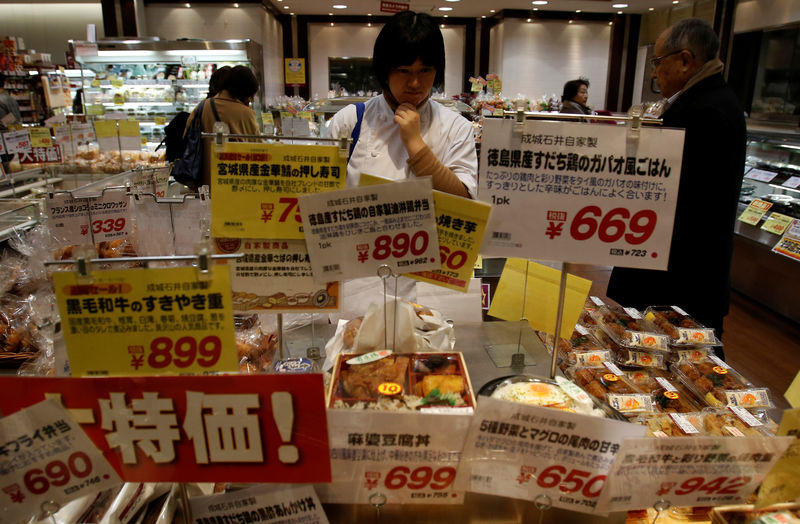By Stanley White
TOKYO (Reuters) - Japanese companies' expectations for inflation over the next year stagnated, a Bank of Japan survey showed on Tuesday, underlining the daunting challenge facing policymakers as they seek to boost growth and prices amid slowing global demand.
Companies expect consumer prices to have risen 0.9 percent a year from now, unchanged from their projection three months ago, according to a quarterly survey by the BOJ.
Firms expect consumer prices to have risen by an annual 1.1 percent three years from now, unchanged from the previous survey. Companies also saw inflation at 1.1 percent five years ahead, slightly below a 1.2 percent increase expected three months ago.
The discouraging inflation expectations reading comes in the face of increasing risks to Japan's economy as global trade slows in a blow to profits and consumption.
There are also uncertainties over the government's plan to raise the sales tax later this year.
"There were signs that some companies would raise prices from April, but this survey shows this will not be a consistent policy," said Shuji Tonouchi, senior market economist at Mitsubishi UFJ Morgan Stanley (NYSE:MS) Securities.
"The labor market remains tight, so our main scenario is for no additional easing, but the sales tax hike is a source of concern."
A separate survey from the BOJ on Monday showed business sentiment slumped to a two-year low in the March quarter, underscoring concerns that Sino-U.S. trade dispute and softening global demand were taking a toll on the export-reliant economy
The BOJ's next policy meeting ends on April 25.
Recent data showed increased strains on Japan's trade-reliant economy.
Core consumer prices rose an annual 0.7 percent in February, slower than a 0.8 percent increase in the previous month, while in the same period exports fell for a third month, suggesting the central bank might be forced to offer more stimulus eventually to temper the effects of slowing external demand and trade frictions.
Slowing global growth, the Sino-U.S. trade war and complications over Britain's exit from the European Union have already forced many policymakers to shift to an easing stance over recent months.
Many in the BOJ expect Japan's economy to emerge from the current soft patch in the second half of this year, assuming China's stimulus plans can revive demand there.
However, economists worry that global trade friction will not subside as the United States re-negotiates trade deals to lower its trade deficit, meaning Japan's economic slowdown could be prolonged.
The government plans to raise the nationwide sales tax to 10 percent from 8 percent in October to generate extra revenue for rising welfare costs.

Some economists and politicians worry that if this plan is not delayed then consumer spending will weaken after the tax hike.